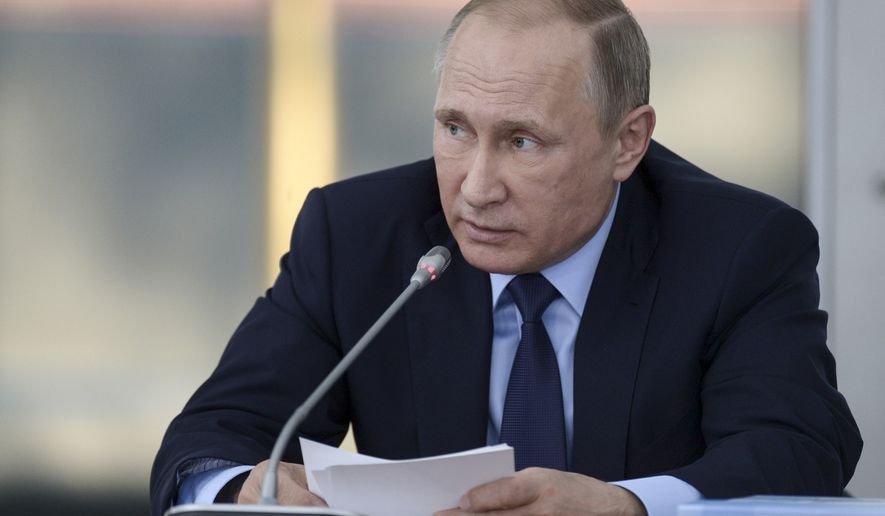Russian President Vladimir Putin has outflanked Washington again in the Syrian civil war by launching bombers this week from a new base — Iran — giving him the power to strike more quickly with heavier bombardments against U.S.-backed rebels, analysts say.
“Perhaps the main thing that is new is that U.S. sole power dominance in the Persian Gulf and the Middle East is coming to an end,” said Stephen Bryen, a former congressional staff director and Pentagon official. “The Russians are now in the game, with assets in Syria and Iran and growing influence via Iran in Iraq.”
Moscow surprised the Obama administration last year by sending a wave of fighter bombers into Syria, moving into an air base in the west and unleashing daily strikes. U.S. officials said the bombs indiscriminately hit civilians, schools and medical centers as well as Free Syrian Army troops backed by Washington. NATO’s commander at the time said Mr. Putin was purposely hitting civilians to drive more refugees into Europe.
The result: Syrian President Bashar Assad strengthened a grip on power that seemed in doubt.
Now, as Moscow holds talks with Secretary of State John F. Kerry on some kind of Syria settlement, Mr. Putin opened this front: Iran. He claims to be hitting Islamic State targets, but a Pentagon spokesman said this week that his bombers are striking areas not known to hold such terrorists.
The bottom line, analysts say, is that Mr. Putin has clearly settled on a strategy to challenge U.S. pre-eminence in the Persian Gulf.
Retired Air Force Lt. Gen. Thomas McInerney, a former fighter pilot and war planner, used the word “outflanked” to describe what the Russian president is doing vis-a-vis Washington.
He said Russia’s Tu-22M3 long-range bombers were too large to operate out of the Syrian base, so opening the sprawling Hamadan base in western Iran makes sense.
“Plus it expands Moscow’s influence in the region,” Mr. McInerney said. “The time to target in Syria is less than one hour, so it enables them to hit our Syrian allies without much warning as well as ISIL.”
The Islamic State is referred to as ISIL, ISIS and Daesh.
“One of Washington’s latest gambits, to do a nuclear deal with Iran, has not shown any evidence of political payback,” wrote Mr. Bryen, an analyst at the American Center for Democracy. “In fact, the latest Russian move, to secure an agreement with Iran for the use of an air base, is shaking up the Middle East.”
He said the isolated Hamadan base has the long runways needed to support the heavy Russian Tu-22M3s and that Moscow suspects the U.S. is warning its Syrian allies when long-range bombers leave Russian bases. Now, the time to warn them is about 40 minutes.
Army Col. Christopher Garver, in his last briefing this week as U.S. military spokesman in Baghdad, said that of the three places Moscow claims it is bombing — Aleppo, Idlib and Deir ez-Zor — only the latter is thought to hold Islamic State targets.
“We have not struck targets in Aleppo in a very long time,” he said. “We have not struck targets in Idlib in a very long time, if we have at all. We don’t see concentrations of ISIS in those areas.”
The implication is clear: Mr. Putin is again bombing civilians and rebels to protect the regime of Mr. Assad, who unleashed chemical weapons in 2013 and killed thousands of innocents.
Retired Air Force Lt. Gen. David Deptula, a former fighter pilot, has advocated a much more robust bombing of the Islamic State in Syria and its home base of Raqqa. He said there are too few airstrikes and an overcautiousness in the U.S.-led effort, allowing the violent organization to stay in operation.
The U.S.-led coalition illustrated its carefulness this week when it allowed Islamic State convoys to exit the city of Manbij, north of Aleppo near the Turkish border, so as not to harm mixed-in civilians.
“The U.S. feeble military action against the Islamic State is what allowed Russia to dramatically up their game in the Middle East,” Mr. Deptula told The Washington Times. “In over two years, the number of U.S. airstrikes in Syria have averaged about six a day — compared to over 1,200 strike sorties a day for 43 days in Desert Storm. The Russian intervention throws the entire regional chessboard upside down. Russia is now basing out of Iran, coordinating with Iraq, Syria and even the Israeli Defense Force.”
Mr. Deptula said he expects Mr. Putin’s next move will be to start naval operations in the Persian Gulf, where the U.S. 5th Fleet runs the show. Iran wants the U.S. out of the Gulf, has harassed Navy ships and has threatened to close the Strait of Hormuz.
Mr. Putin also is building up forces on the Ukraine border and setting up military posts in the Arctic.
“He is showing the Russians can walk and chew gum as well as play chess, while the current U.S. administration foreign and military policy is a shambles,” Mr. Deptula said. “The gradualistic, weak and uncertain policies of the Obama national security team in the Middle East have yielded a dramatic advantage to the Russians.”
The Russian Defense Ministry on Thursday issued an update on its bombing campaign. It said Tu-22M3s and Su-34 fighters from Iran hit targets only in Deir ex-Zor and targeted only the Islamic State.
“As a result, the strikes have eliminated five large depots with armament, munitions and fuel, six control centers, a large number of militants, artillery positions and armored hardware of terrorists,” the ministry said.
• Rowan Scarborough can be reached at rscarborough@washingtontimes.com.




Please read our comment policy before commenting.